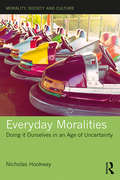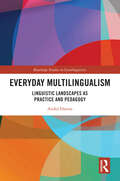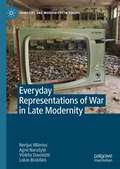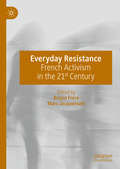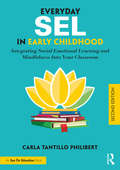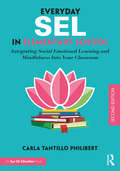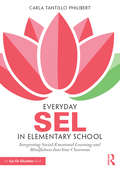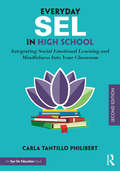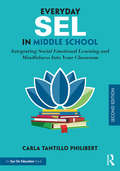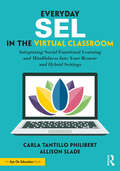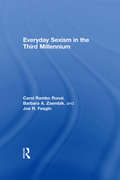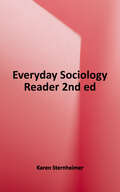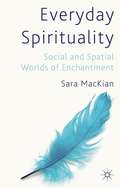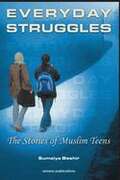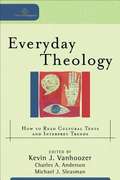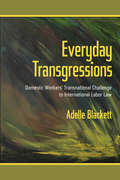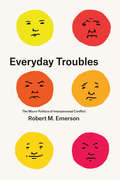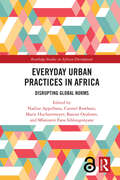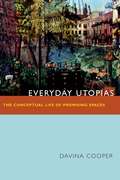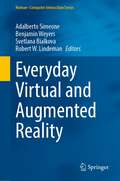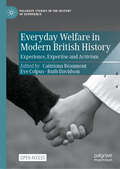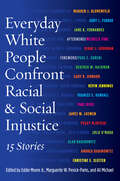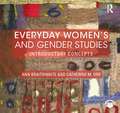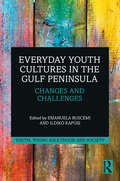- Table View
- List View
Everyday Moralities: Doing it Ourselves in an Age of Uncertainty (Morality, Society and Culture)
by Nicholas HookwayFrom concerns of dwindling care and kindness for others to an excessive concern with self and consumerism, plenty of evidence has been provided for the claim that morality is in decline in the West, yet little is known about how people make-sense of and experience their everyday moral lives. This insightful book asks how late-modern subjects construct, understand and experience morality in a context of moral uncertainty. With a focus on two areas of morality and human conduct – love and intimacy, and the human treatment of animals – the author draws on the work of Bauman, Ahmed, Irigaray, Foucault and Taylor to construct an innovative theoretical synthesis, which is combined with new empirical material drawn from online diaries or blogs to examine the complex and intriguing ways that contemporary subjects narrate and experience everyday moral-decision-making. Providing theoretical and empirical insights into the contemporary production of morality and selfhood in late-modernity, Everyday Moralities sheds new light on the ways in which people morally navigate a changing social world and advances sociology beyond models of narcissism, moral loss and community breakdown. As such, it makes an important contribution to an underdeveloped area of the discipline, explicitly addressing the everyday ways morality is lived and practiced in a climate of moral ambiguity.
Everyday Multilingualism: Linguistic Landscapes as Practice and Pedagogy (Routledge Studies in Sociolinguistics)
by Anikó HatossHatoss explores multilingualism in diverse suburbs of Sydney through the oral and written narratives of student ethnographers. Her research is based on visual ethnography, interviews with local residents and classroom discussions of the fieldwork. The findings of this book contribute to the scholarship of sociolinguistics of globalisation and seek to enhance our understanding of the complex interrelationship between the linguistic landscape and its participants: how language choices are negotiated, how identity and ideologies shape interactions in everyday contexts of the urban landscape. The narrative approach provides a multi-layered analysis to better understand the micro and macro connections shaping everyday interactions, conviviality and social relations. Hatoss offers methodological and pedagogical insights into the development of global citizenship and intercultural competence through the experiential learning provided by the linguistic landscape project. This volume is a useful source for researchers working in diverse fields of multilingualism, diaspora studies, narratives and digital ethnographies in sociolinguistics. It offers methodological insights to the study of urban multilingualism and pedagogical insights into using linguistic landscapes for developing intercultural competence.
Everyday Representations of War in Late Modernity (Identities and Modernities in Europe)
by Violeta Davoliūtė Nerijus Milerius Agnė Narušytė Lukas BrašiškisThis book analyses photographic and cinematographic representations of war and its memorialisation rituals in the period of late modernity from the perspectives of cultural sociology, philosophy, art theory and film studies. It reveals how the experience of war trauma takes root in everydayness and shows how artists try to question the ‘normality’ of the everyday, to actualise the memory of war trauma, to rethink the contrasting experiences of the time of war and everydayness, and to oppose the imposed historical narratives. The new representations are analysed by developing theories of war as a ‘magic spectacle’, also by using such concepts as spectres, triumph and trauma, collective social catastrophes, forensic architecture and others.
Everyday Resistance: French Activism in the 21st Century
by Bruno Frère Marc JacquemainThis book studies those who, in various domains of life, are resisting the increasingly harsh day-to-day pressures of “late capitalism,” centering mainly on French examples. Far from the global euphoria of the sixties and seventies, everyday people are trying to loosen the grip of injustice in very concrete ways: people experiencing homelessness try to occupy and live in empty buildings; collectives of small farmers and consumers avoid long (and costly) commercial supply chains to defend their common interests; students and teachers organize to prevent the expulsion of undocumented migrants; and activists in the free software movement fight for the “common ownership” of software and of the Internet. Through civil disobedience in the midst of daily life, people are trying to resist, work against, and change laws that protect the interests of firms and corporations considered socially or ecologically unfair.
Everyday SEL in Early Childhood: Integrating Social Emotional Learning and Mindfulness Into Your Classroom
by Carla Tantillo PhilibertWith this bestselling book from educational consultant Carla Tantillo Philibert, you’ll gain practical strategies for teaching Social Emotional Learning (SEL), mindfulness, and well-being to help improve the human connection between you and your students. You’ll find out how to lead students through mindfulness activities, simple yoga poses, and breath-work techniques. Topics include mindful practices, well-being strategies to combat stress and anxiety, giving your students the space to understand their emotions and strengthen peer-to-peer communication, developing the foremost and essential SEL competencies, and engaging in experiential activities to strengthen SEL skills. The new edition reflects the latest CASEL guidelines and includes updated activities, as well as a brand-new directory of terms, and an intentional focus on educators’ and students’ socio-emotional well-being. Perfect for early childhood educators at any level of experience, the book will help you develop positive youth identity and promote connectedness so students can deal successfully with life’s stressors beyond school doors.
Everyday SEL in Elementary School: Integrating Social Emotional Learning and Mindfulness Into Your Classroom
by Carla Tantillo PhilibertWith this bestselling book from educational consultant Carla Tantillo Philibert, you’ll gain practical strategies for teaching Social Emotional Learning (SEL), mindfulness, and well-being to help improve the human connection between you and your students. You’ll find out how to lead students through mindfulness activities, simple yoga poses, and breath-work techniques. Topics include mindful practices, well-being strategies to combat stress and anxiety, giving your students the space to understand their emotions and strengthen peer-to-peer communication, developing the foremost and essential SEL competencies, and engaging in experiential activities to strengthen SEL skills. The new edition reflects the latest CASEL guidelines and includes updated activities, as well as a brand-new directory of terms, and an intentional focus on educators’ and students’ socio-emotional well-being. Perfect for elementary school educators at any level of experience, the book will help you develop positive youth identity and promote connectedness so students can deal successfully with life’s stressors beyond school doors.
Everyday SEL in Elementary School: Integrating Social-Emotional Learning and Mindfulness Into Your Classroom
by Carla Tantillo PhilibertIn this new book from educational consultant Carla Tantillo Philibert, you’ll gain practical strategies for teaching social-emotional learning (SEL), mindfulness, and movement to help your elementary students maintain positive relationships, assume responsibility, become bodily aware, and grow into productive, contributing citizens. You’ll find out how to lead students through games, simple yoga poses, breathing techniques, and other activities that are easy to incorporate and help you manage your classroom. Topics include: Empowering your students to understand their emotions, improve their focus, manage stress, and regulate their behavior through structured activities Introducing your students to the concept of SEL and setting up your own SEL classroom Engaging your students in activities to strengthen peer-to-peer communication, community-building, and leadership skills Allowing your students to test their SEL skills through interactive stories and class discussions Honing your own SEL competency through professional development sessions so your students can get the most out of their SEL experience The book also offers a Professional Development Facilitator’s Guide to help you and your colleagues master the core concepts of SEL and implement them effectively in the classroom. The appendix provides additional strategies for overcoming common difficulties when first beginning your school’s SEL journey.
Everyday SEL in High School: Integrating Social Emotional Learning and Mindfulness Into Your Classroom
by Carla Tantillo PhilibertWith this bestselling book from educational consultant Carla Tantillo Philibert, you’ll gain practical strategies for teaching Social Emotional Learning (SEL), mindfulness, and well-being to help improve the human connection between you and your students. You’ll find out how to lead students through mindfulness activities, simple yoga poses, and breath-work techniques. Topics include mindful practices, well-being strategies to combat stress and anxiety, giving your students the space to understand their emotions and strengthen peer-to-peer communication, developing the foremost and essential SEL competencies, and engaging in experiential activities to strengthen SEL skills. The new edition reflects the latest CASEL guidelines and includes updated activities, as well as a brand-new directory of terms, and an intentional focus on educators’ and students’ socio-emotional well-being. Perfect for high school educators at any level of experience, the book will help you develop positive youth identity and promote connectedness so students can deal successfully with life’s stressors beyond school doors.
Everyday SEL in Middle School: Integrating Social Emotional Learning and Mindfulness Into Your Classroom
by Carla Tantillo PhilibertWith this bestselling book from educational consultant Carla Tantillo Philibert, you’ll gain practical strategies for teaching Social Emotional Learning (SEL), mindfulness, and well-being to help improve the human connection between you and your students. You’ll find out how to lead students through mindfulness activities, simple yoga poses, and breath-work techniques. Topics include mindful practices, well-being strategies to combat stress and anxiety, giving your students the space to understand their emotions and strengthen peer-to-peer communication, developing the foremost and essential SEL competencies, and engaging in experiential activities to strengthen SEL skills. The new edition reflects the latest CASEL guidelines and includes updated activities, as well as a brand-new directory of terms, and an intentional focus on educators’ and students’ socio-emotional well-being. Perfect for middle school educators at any level of experience, the book will help you develop positive youth identity and promote connectedness so students can deal successfully with life’s stressors beyond school doors.
Everyday SEL in the Virtual Classroom: Integrating Social Emotional Learning and Mindfulness Into Your Remote and Hybrid Settings
by Carla Tantillo Philibert Allison SladeLearn specific strategies for implementing social emotional learning (SEL), mindfulness, and well-being in a virtual classroom. This essential new resource from well-being experts Carla Tantillo Philibert and Allison Slade will help you build students’ Self-Awareness and Self-Regulation skills, school connectedness, Social Awareness, voice, and agency in remote or hybrid settings. Appropriate for teachers of all grade levels, as well as for instructional leaders and parents, the book emphasizes the educator’s own self-care and emotional intelligence, so you can become more aware of how the environment affects you along with your students. It also offers ideas for planning collaboratively with colleagues and engaging families in the virtual environment. Throughout, the authors share a variety of activities and practices you can implement immediately, along with sample scripts and educator tips. With the inspiring advice in this book, you’ll be able to help create emotionally healthy classrooms and school environments so that all students and educators can thrive, even during the most uncertain times.
Everyday Sexism in the Third Millennium
by Joe R. Feagin Carol Rambo Ronai Barbara A. ZsembikThis collection features new and original research on the range of sexism still faced every day by women in US society. It documents oppression across ethnic, racial, class, and sexual orientation groups in a wide range of gendered spaces, including the home, the workplace, unions, educational institutions, and the Internet. Exploring the way these different but related systems of oppression interact, the editors come to view sexism not as a static thing, but as part of a "dialectic of domination" in which women are simultaneously oppressed and capable of oppressing others through their discourse and practice. With its broad range of approaches, its focus on discourse and experience in gendered spaces, and its debunking of the personal and societal fictions of gender, this book goes a long way toward explaining why sexism is still so pervasive in everyday life.
Everyday Silence and the Holocaust
by Irene LevinEveryday Silence and the Holocaust examines Irene Levin’s experiences of her family’s unspoken history of the Holocaust and the silence that surrounded their war experiences as non-topics.A central example of what C. Wright Mills considered the core of sociology – the intersection of biography and history – the book covers the process by which the author came to understand that notes found in her mother’s apartment following her death were not unimportant scribbles, but in fact contained elements of her mother’s biographical narrative, recording her parents’ escape from occupied Norway to unoccupied Sweden in late 1942. From the mid-1990s, when society began to open up about the atrocities committed against the Jews, so too did the author find that her mother and the wider Jewish population ceased to be silent about their war experiences and began to talk. Charting the process by which the author traced the family’s broader history, this book explores the use of silence, whether in the family or in society more widely, as a powerful analytic tool and examines how these silences can intertwine. This book provides insight into social processes often viewed through a macro-historical lens by way of analysis of the life of an "ordinary" Jewish woman as a survivor.An engaging, grounded study of the biographical method in sociology and the role played by silence, this book will appeal to readers with an interest in the Holocaust and World War II, as well as in social scientific research methods. It will be of use to both undergraduate and postgraduate scholars in the fields of history, social science, psychology, philosophy, and the history of ideas.The Open Access version of this book, available at http://www.taylorfrancis.com, has been made available under a Creative Commons [Attribution-Non Commercial-No Derivatives (CC-BY-NC-ND)] 4.0 license.
Everyday Sociology Reader
by Karen SternheimerThis book combines classic and contemporary readings by sociologists with posts from the Everyday Sociology blog to help students make connections between major sociological concepts, popular culture, current events, and everyday life. A wealth of suggested activities, exercises, discussion questions, and essay topics gets students actively engaging in sociological thinking, writing, and research.
Everyday Spirituality
by Sara MackianThis book puts spirit back at the heart of spirituality. By exploring the everyday impacts of alternative spiritual beliefs and practices, the book examines contemporary spirituality and how critical social science can map and understand it.
Everyday Struggles: The Stories of Muslim Teens
by Sumaiya BeshirThis is a collection of stories of Muslim teens and their peers.
Everyday Theology: How to Read Cultural Texts and Interpret Trends (Cultural Exegesis)
by Kevin J. Vanhoozer Michael J. Sleasman Charles A. AndersonEveryday theology is the reflective and practical task of living each day as faithful disciples of Jesus Christ. In other words, theology is not just for Sundays, and it's not just for professional theologians. Everyday Theology teaches all Christians how to get the theological lay of the land. It enables them to become more conscious of the culture they inhabit every day so that they can understand how it affects them and how they can affect it. If theology is the ministry of the Word to the world, everyday theologians need to know something about that world, and Everyday Theology shows them how to understand their culture make an impact on it. Engaging and full of fresh young voices, this book is the first in the new Cultural Exegesis series.
Everyday Transgressions: Domestic Workers' Transnational Challenge to International Labor Law
by Adelle BlackettAdelle Blackett tells the story behind the International Labour Organization's (ILO) Decent Work for Domestic Workers Convention No. 189, and its accompanying Recommendation No. 201 which in 2011 created the first comprehensive international standards to extend fundamental protections and rights to the millions of domestic workers laboring in other peoples' homes throughout the world. As the principal legal architect, Blackett is able to take us behind the scenes to show us how Convention No. 189 transgresses the everyday law of the household workplace to embrace domestic workers' human rights claim to be both workers like any other, and workers like no other. In doing so, she discusses the importance of understanding historical forms of invisibility, recognizes the influence of the domestic workers themselves, and weaves in poignant experiences, infusing the discussion of laws and standards with intimate examples and sophisticated analyses. Looking to the future, she ponders how international institutions such as the ILO will address labor market informality alongside national and regional law reform. Regardless of what comes next, Everyday Transgressions establishes that domestic workers' victory is a victory for the ILO and for all those who struggle for an inclusive, transnational vision of labor law, rooted in social justice.
Everyday Troubles: The Micro-Politics of Interpersonal Conflict
by Robert M. EmersonFrom roommate disputes to family arguments, trouble is inevitable in interpersonal relationships. In Everyday Troubles, Robert M. Emerson explores the beginnings and development of the conflicts that occur in our relationships with the people we regularly encounter—family members, intimate partners, coworkers, and others—and the common responses to such troubles. To examine these issues, Emerson draws on interviews with college roommates, diaries documenting a wide range of irritation with others, conversations with people caring for family members suffering from Alzheimer’s, studies of family interactions, neighborly disputes, and other personal accounts. He considers how people respond to everyday troubles: in non-confrontational fashion, by making low-visibility, often secretive, changes in the relationship; more openly by directly complaining to the other person; or by involving a third party, such as friends or family. He then examines how some relational troubles escalate toward extreme and even violent responses, in some cases leading to the involvement of outside authorities like the police or mental health specialists. By calling attention to the range of possible reactions to conflicts in interpersonal relationships, Emerson also reminds us that extreme, even criminal actions often result when people fail to find ways to deal with trouble in moderate, non-confrontational ways. Innovative and insightful, Everyday Troubles is an illuminating look at how we deal with discord in our relationships.
Everyday Urban Practices in Africa: Disrupting Global Norms (Routledge Studies in African Development)
by Nadine Appelhans Basirat Oyalowo Carmel Rawhani Marie Huchzermeyer Mfaniseni Fana SihlongonyaneThis book disrupts the dominant underlying international norms informing urban development strategies across African cities. International policy frameworks have created a new universal agenda for developing cities. However, these frameworks have also imposed global paradigms and discourses that are often in conflict with local urbanisms. As we approach the deadline for achieving the Sustainable Development Goals, there is need for reflection and deliberation on a post-2030 agenda.The authors identify powerful assumptions, norms, and positionalities that obfuscate the efforts to achieve sustainable development in African cities, as well as along the North–South divide. They argue that a disruptive critique of these normative concepts, grounded in the lived African urban everyday, opens up opportunities to dismantle their assumed neutrality. Through disruption, the authors critically re-interpret the meanings of policy and the praxis of local urbanism, ultimately challenging the logic of universalising concepts underpinning implementation in the current international policy system, and asserting the need for contextualised urban policies.The book will be of interest to scholars and students of urban studies, development planning, urban governance, human settlements, development studies, urban geography, and African studies. It will also be useful for practitioners including town and regional/urban planners, urban policy consultants, and international development cooperation agencies.The Open Access version of this book, available at http://www.taylorfrancis.com, has been made available under a Creative Commons Attribution-Non Commercial-No Derivatives (CC-BY-NC-ND) 4.0 license.
Everyday Utopias: The Conceptual Life of Promising Spaces
by Davina CooperEveryday utopias enact conventional activities in unusual ways. Instead of dreaming about a better world, participants seek to create it. As such, their activities provide vibrant and stimulating contexts for considering the terms of social life, of how we live together and are governed. Weaving conceptual theorizing together with social analysis, Davina Cooper examines utopian projects as seemingly diverse as a feminist bathhouse, state equality initiatives, community trading networks, and a democratic school where students and staff collaborate in governing. She draws from firsthand observations and interviews with participants to argue that utopian projects have the potential to revitalize progressive politics through the ways their innovative practices incite us to rethink mainstream concepts including property, markets, care, touch, and equality. This is no straightforward story of success, however, but instead a tale of the challenges concepts face as they move between being imagined, actualized, hoped for, and struggled over. As dreaming drives new practices and practices drive new dreams, everyday utopias reveal how hard work, feeling, ethical dilemmas, and sometimes, failure, bring concepts to life.
Everyday Virtual and Augmented Reality (Human–Computer Interaction Series)
by Benjamin Weyers Adalberto Simeone Svetlana Bialkova Robert W. LindemanThis edited book introduces readers to the area of “Everyday Virtual and Augmented Reality”. With Virtual and Augmented Reality technologies, becoming more pervasive in our homes and workplaces, new use cases and scenarios emerge together with new challenges that need to be addressed. These challenges encompass the design and implementation of appropriate VR/AR applications for ordinary environments that were not built with the explicit intention of supporting VR systems. The everyday/domestic environments present a range of issues that are usually not present in the physical locations purposed for VR and AR use in academic or professional environments, such as constrained spaces, presence of obstacles, absence of instrumentation, social and organizational restrictions etc. To address the above challenges, we collect the latest work from the Virtual Reality and Augmented Reality research community, by combining the presentation of general definitions and characterization of the field, of interaction concepts and techniques, of a variety of use cases and areas. The constellation of different environment examples (from education, sport to consumer and marketing), from across the globe and platforms, provide a comprehensive discussion on scientific and engineering methods, which enable the development of VR/AR systems in everyday context.
Everyday Welfare in Modern British History: Experience, Expertise and Activism (Palgrave Studies in the History of Experience)
by Eve Colpus Ruth Davidson Caitríona BeaumontThis open access book offers a new approach to understandings of welfare in modern Britain. Foregrounding the agency individuals and groups claimed through experiential expertise, it traces deep connections between personal experience, welfare, and activism across diverse settings in modern Britain. The experiential experts studied in this collection include women, students, children, women who have sex with women, bereaved families, community groups, individuals living in poverty, adults whose status sits outside professional categories, health service users, and people of faith. Chapters trace how these groups have used their experiences to assert an expert witness status and have sought out new spaces to expand the scope, inclusivity, and applicability of welfare services.
Everyday White People Confront Racial and Social Injustice: 15 Stories
by Marguerite W. Penick-Parks Ali Michael Eddie MooreWhile we are all familiar with the lives of prominent Black civil rights leaders, few of us have a sense of what is entailed in developing a White anti-racist identity. Few of us can name the White activists who joined the struggle against discrimination, let alone understand the complexities, stresses and contradictions of doing this work while benefiting from the privileges they enjoyed as Whites. This book fills that gap by vividly presenting – in their own words – the personal stories, experiences and reflections of fifteen prominent White anti-racists. They recount the circumstances that led them to undertake this work, describe key moments and insights along their journeys, and frankly admit their continuing lapses and mistakes. They make it clear that confronting oppression (including their own prejudices) – whether about race, sexual orientation, ability or other differences – is a lifelong process of learning. The chapters in this book are full of inspirational and lesson-rich stories about the expanding awareness of White social justice advocates and activists who grappled with their White privilege and their early socialization and decided to work against structural injustice and personal prejudice. The authors are also self-critical, questioning their motivations and commitments, and acknowledging that – as Whites and possessors of other privileged identities – they continue to benefit from White privilege even as they work against it.This is an eye-opening book for anyone who wants to understand what it means to be White and the reality of what is involved in becoming a White anti-racist and social justice advocate; is interested in the paths taken by those who have gone before; and wants to engage reflectively and critically in this difficult and important work.Contributing AuthorsWarren J. BlumenfeldAbby L. FerberJane K. FernandesMichelle FineDiane J. GoodmanPaul C. GorskiHeather W. HackmanGary R. HowardKevin JenningsFrances E. KendallPaul KivelJames W. LoewenPeggy McIntoshJulie O’MaraAlan RabinowitzAndrea RabinowitzChristine E. Sleeter
Everyday Women's and Gender Studies: Introductory Concepts
by Ann Braithwaite Catherine M. OrrEveryday Women’s and Gender Studies is a text-reader that offers instructors a new way to approach an introductory course on women’s and gender studies. This book highlights major concepts that organize the diverse work in this field: Knowledges, Identities, Equalities, Bodies, Places, and Representations. Its focus on "the everyday" speaks to the importance this book places on students understanding the taken-for granted circumstances of their daily lives. Precisely because it is not the same for everyone, the everyday becomes the ideal location for cultivating students’ intellectual capacities as well as their political investigations and interventions. In addition to exploring each concept in detail, each chapter includes up to five short recently published readings that illuminate an aspect of that concept. Everyday Women’s and Gender Studies explores the idea that "People are different, and the world isn’t fair," and engages students in the inevitably complicated follow-up question, "Now that we know, how shall we live?"
Everyday Youth Cultures in the Gulf Peninsula: Changes and Challenges (Youth, Young Adulthood and Society)
by Emanuela BuscemiFocusing on the struggles of youth in the Arabian Gulf to find their place in their encounters with modernity, Everyday Youth Cultures in the Gulf Peninsula explores how global forces are reshaping everyday cultural experiences in authoritarian societies. A deeper understanding of Gulf youth emerges from reading about the everyday lives and struggles, opportunities, and contributions of youth who, in the process of developing their personal identities, are also incrementally transforming their societies and cultures. Based on ethnographic fieldwork in Kuwait, Oman, Saudi Arabia, the UAE, and Qatar, the chapters bring fresh insight into Gulf youth microcultures from the ground and invite dialogue by engaging young local and foreign academics in the discussion. In light of the general difficulties of accessing Gulf societies, the book’s nuanced, richly detailed depictions of everyday life can be of interest to academic research in Middle East studies, youth sociology, political science and anthropology, as well as to business and governmental decision-making.
